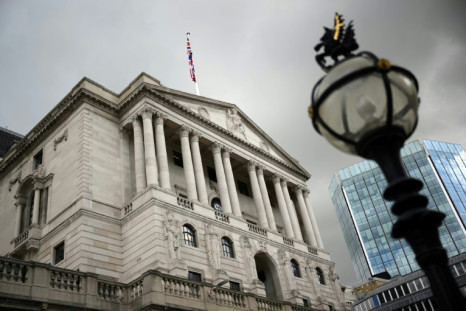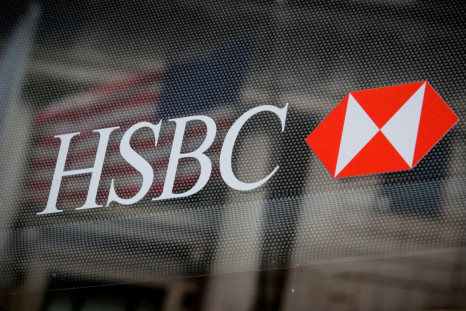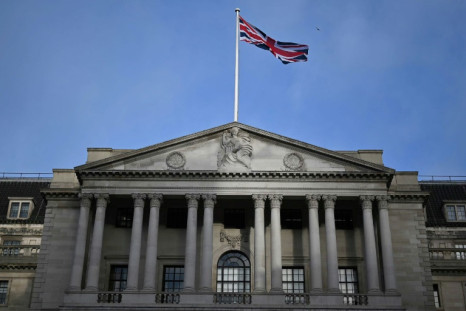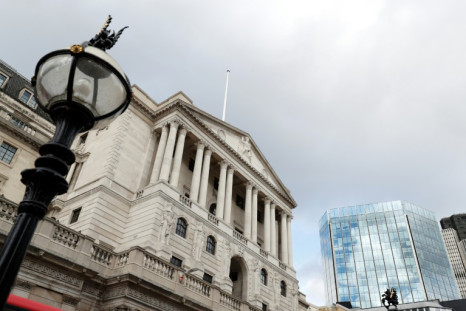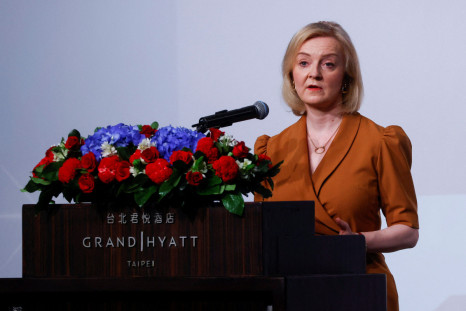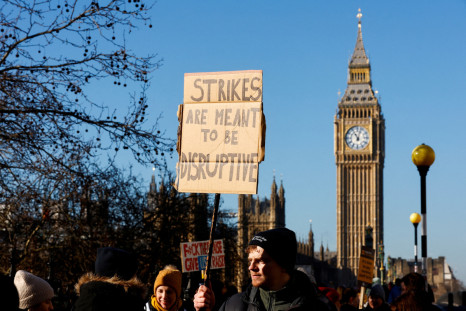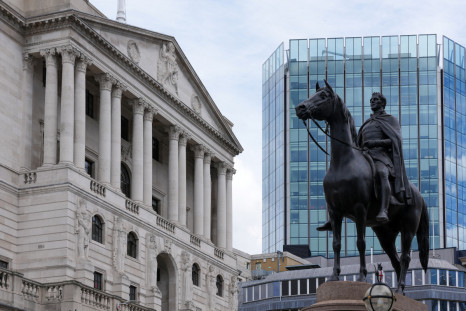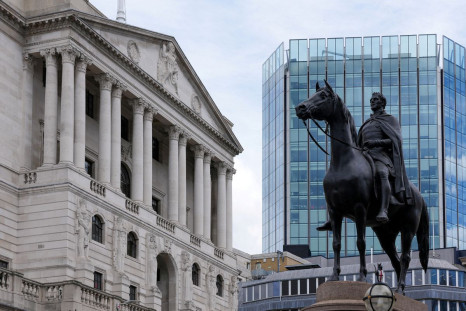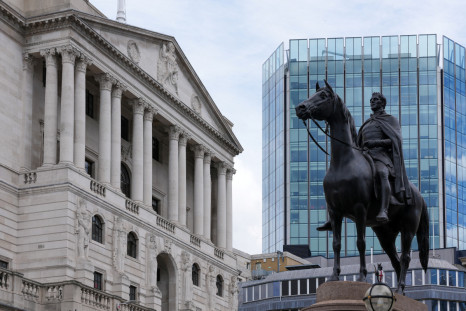Home
> Bank of England
Bank of England
Central Banks Risk Tipping UK and Other Developed Countries Into Recession
The report highlights the risk of a vicious cycle, where low interest rates fail to stimulate meaningful economic growth and cause a recession.
Jastine Beatrice Yap Nov 29, 2023
Tories Slammed For Brexit After Bank of England Says It Has 'Chilled' UK Economy
The financial impacts of Brexit have left UK business investment levels "chilled", according to the Deputy Governor of the Bank of England.
Danielle Summer Nov 28, 2023
UK Inflation Plunges to Lowest Figure in 2023 At 4.6% as Sunak on Track to Meet Annual Target
In September, inflation stood at 6.7 per cent, as many people across the UK continue to struggle with the cost-of-living crisis.
Callum Conway-Shaw Nov 15, 2023
Nationwide's Competitive Two-Year Fixed-Rate Mortgage Signals Positive Shift in Property Market
Mortgage brokers have hailed Nationwide's decision as a "watershed moment", anticipating a revitalisation of the property market and instilling hope among borrowers.
Pragati Singh Nov 10, 2023
October UK Retail Sales Drop Triggering Recession Worry in the UK Economy
UK retail sales growth declined in October as UK consumers are cautious of spending and saving for Christmas amidst the cost-of-living crisis which has sparked a recession for the UK economy.
Pratiti Nath Nov 08, 2023
Bank of England Holds Interest Rates At 5.25% for Second Time
Nine members of the Monetary Policy Committee (MPC) voted 6-3 in favour of maintaining the current rate, in a move that was widely anticipated.
Callum Conway-Shaw Nov 03, 2023
HSBC Expresses Concerns About UK's Economic Outlook Despite a 240% Rise in Profits
HSBC, headquartered in London but primarily focused on the Asian market, announced pre-tax profits of $7.7 billion (£6.4 billion) for the third quarter spanning from July to September.
Pragati Singh Oct 31, 2023
UK Economy at Risk of Recession as Business Activity Declines and Cost Pressures Ease
The preliminary reading of the S&P Global UK PMI for the services sector, often referred to as the "flash" PMI, fell to 49.2 in October from 49.3 in September.
Pragati Singh Oct 26, 2023
UK Businesses 'Stuck in Reverse' in October, According to Recent Survey
The figures are worrying reading, as the Bank of England (BoE) prepares for its latest interest rate decision next week.
Callum Conway-Shaw Oct 25, 2023
UK Inflation Resists Expected Slowdown in September Amid Rising Oil Prices
CPI reported a year-on-year increase of 6.7 per cent, maintaining the same pace as the previous month, contrary to economists' predictions of a dip to 6.6 per cent.
Pragati Singh Oct 18, 2023
Economic Challenges Mount as UK Retail Sales Slow Amid Rising Inflation and Global Uncertainties
The latest sales-monitor report from the British Retail Consortium has revealed a slowdown in retail sales growth in the UK for September. Despite a fall in inflation, the high cost of living continues to place pressure on households' budgets.
Pragati Singh Oct 11, 2023
UK Housing Market Faces 5.3% Yearly Decline as Interest Rates Squeeze Prices
According to Nationwide, the largest British building society, the seasonally adjusted housing price index revealed that prices remained stagnant in September, following a 0.8% decrease in August.
Pragati Singh Oct 02, 2023
Bank of England Holds Interest Rates at 5.25%
The decision to hold the rate comes after figures revealed an unexpected slowdown in inflation in August.
Callum Conway-Shaw Sep 21, 2023
UK Inflation Rate Drops for the Third Consecutive Month Despite Expectations
Whilst Whitehall says the slight drop in inflation month-on-month means its policies are working, the UK still has one of the highest inflation rates in the G20.
Mehar Sultan Sep 21, 2023
Ex-Bank Of England Governor Mark Carney Says Former PM Liz Truss Turned Britain Into 'Argentina On The Channel'
Liz Truss has vehemently defended the policies she tried to enact during her short time as prime minister. Mark Carney also criticised "far-right populists" and Brexiteers for having a "basic misunderstanding of what drives economies".
Birupaksh Kaundilya Sep 19, 2023
Experts predict the Bank of England will raise interest rates a final time from 5.25% to 5.5%
Initial GDP figures for July show a fall of 0.5 per cent, a worse performance than expected by economists, increasing the fears of a "mild recession".
Mehar Sultan Sep 13, 2023
UK housing market faces steepest annual price drop in 14 years
The abrupt increase in mortgage rates in recent months has been a response to the Bank of England's actions, which have raised interest rates 14 times since December 2021.
Pragati Singh Sep 04, 2023
UK SMEs postponing investment plans as they cope with higher costs
UK small businesses are postponing their investment plans as they grapple with inflationary pressures and higher interest rates in line with fiscal policy.
Liz Slee Aug 31, 2023
The mental health of 14 million people is affected by rising mortgage rates
New research from Mind has revealed the detrimental impact that soaring mortgage costs are having on people's mental health, as well as their finances.
Taylor J. Mustafa Aug 09, 2023
Bank of England warns of rising mortgage payments and potential struggles for UK households
The Bank of England warns that nearly one million UK households will face higher mortgage payments due to rising interest rates, potentially impacting financial stability.
Pragati Singh Jul 13, 2023
UK house prices experience modest growth in June – yet annual decline at fastest rate since 2009
UK house prices grew slightly in June but fell at the fastest rate since 2009, impacted by soaring mortgage costs, with two-year fixed-rate mortgage rates climbing past six per cent.
Pragati Singh Jul 04, 2023
Wrong policy decisions may play a key role in Britain's high inflation rates
Apart from global factors, UK policy decisions have exacerbated inflation – whether post-pandemic public spending or the slow pace of interest rate hikes.
Mehar Sultan Jun 23, 2023
Bank of England set to increase interest rate for the 13th time in a row
The Bank of England is expected today to raise the interest rate for the 13th time in a row, despite recent forecasts of an improving economic outlook.
Callum Conway-Shaw Jun 22, 2023
Latest labour market data spells more trouble for UK mortgage holders
A reported 1.3 million UK households with mortgages were already expecting increased costs at the start of the year. The latest data means there is more pain yet to come.
Mehar Sultan Jun 15, 2023
UK interest rates raised for 12th time in a row to highest level for almost 15 years
UK interest rates have been raised for the 12th time in a row in a further attempt by the Bank of England to slow the rising cost of living, increasing the Bank's base rate from 4.25 to 4.5 per cent.
Callum Conway-Shaw May 11, 2023
Food inflation hits 15% as experts say retailers must focus on price differentiation
Food inflation has risen by 15 per cent in a year, as prices in Britain's shops reach unprecedented levels. Experts say retailers must focus on their price differentiation strategy as consumers' purse strings "continue to feel the squeeze".
Callum Conway-Shaw Mar 29, 2023
Is communication the key to retaining talent amongst current economic turmoil?
As worker shortages plague the UK economy amidst a cost of living crisis, new research shows good communication is key to talent retention.
Mehar Sultan Mar 24, 2023
Bank of England and Federal Reserve claim banking systems are secure
The Bank of England and the US Federal Reserve have claimed the safety and strength of banking systems ahead of key decisions on interest rates.
Jake Pike Mar 22, 2023
Bank of England and HM Treasury considers 'digital pound'
Declining cash usage fuels current Bank of England and HM Treasury consultation on a new 'digital pound' before the end of this decade.
Francesca Miller Mar 13, 2023
UK economy in crisis, as the Chancellor urges missing workforce to return
Latest figures from the ONS reveal zero GDP growth in Q4 2022. A labour shortage is part of the problem, with the Chancellor urging people to return to work.
Mehar Sultan Feb 16, 2023
Pages
- PREV
- 1
- 2
- 3
- 4
- 5
- 6
- 7
- 8
- 9
- NEXT







